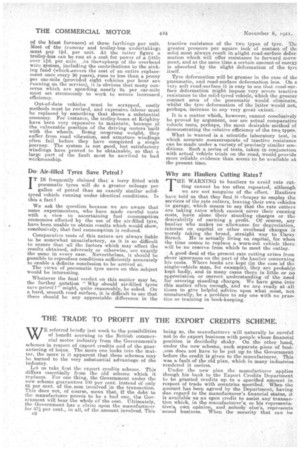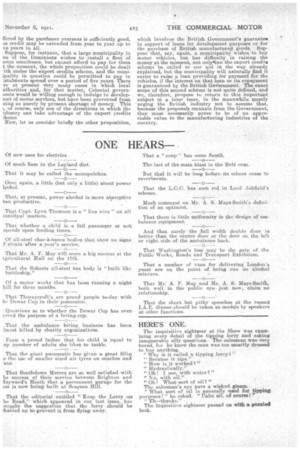THE TRADE TO PROFIT BY THE EXPORT CREDITS SCHEME.
Page 2

Page 3

If you've noticed an error in this article please click here to report it so we can fix it.
WE referred briefly last week to the possibilities of benefit accruing to the British commercial motor industry from the Government's schemes in respect of export credits and of the guarauteeing of loans. The more one looks into the matter, the more is it apparent that these schemes may be turned to the very substantial advantage of the industry.
Let us take first the export credits scheme. This differs essentially from the old scheme which it replaces. For one thing, the Government under the new scheme guarantees 100 per cent, instead of only 85 per cent, of the, sum involved in the transaction. This does not, of course, mean that, if the debt to the manufacturer proves to be a bad one, the Government will bear-the whole of the cost. Ultimately, the Government has a claim upon the manufacturer for 571, per cent., in all, of the amount.involved. This
c6
being so, the manufacturer will naturally be careful not to do export business with people whose financial position is decidedly shaky. On the other, hand, under the new scheme, each separate piece of busieess does not have to be put up to the Government before the credit is given to the manufacturer. This was a fault of the old plan, which in many industries rendered it useless.
Under the new plan the manufacturer applies though his bank to the Export Credits Department to be granted credits up to a specified amount in respect of trade with countries specified. When the amount has been agreed by the Department, having due regard to the manufacturer's financial status, -it is available as au open credit to assist any transaction which, in the manufacturer's, or his representative's, own opinion and nobody else's, represents sound business. *hen the security that can be ffered by the purchaser overseas is sufficiently good, is credit may be extended from year to year up to ye years in all.
Suppose, for instance, that a large municipality in ne of the Dominions wishes to .install a fleet of kotor omnibuses, but cannot afford to pay for them t the moment, the whole proposition could be dealt ith under the export credits scheme, and the muniipality in question could he permitted to pay in -,:stalments spread over a period of five years. There re at present very many cases in which local uthorities and, for that matter, Colonial governtents would he willing enough to indulge in developkent of motor services, but have been prevented from oing so purely by present shortage of money. This k, of course, only one of the directions in which the idustry can take advantage of the export credits 2heme.
Now, let us consider briefly the other proposition, which involves the British Government's guarantee in support of loans for development purposes or for the purchase of British manufactured goods. Suppose that, say, again, a municipality wishes to buy motor vehicles, but has difficulty in raising the money at the moment, not onlytan the export Credits scheme he called to our aid in the way already eXplained, but the municipality will naturally find it easier to raise a loan providing for payment for the vehicles, if the interest on that loan or its repayment is guaranteed by the British Government. The exact scope of this second scheme is not quite defined, and we, therefore, Propose to return to this important subject in a, later issue, in the meanwhile merely urging the British industry not to assume that, because the proposals emanate from the Government, they must necessarily prove to be of no appreciable value to the manufacturing industries of the coo ntry.
































